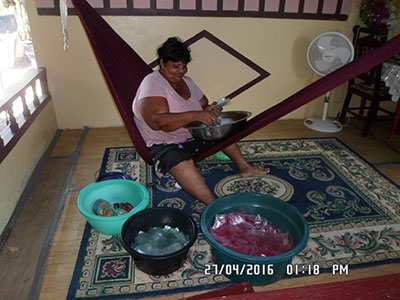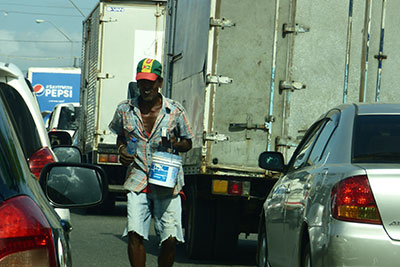– ordinary Guyanese traversing communities to earn an honest and independent living
By Ravena Gildharie
FIFTY-seven-year-old Narda Mohabir resides at Bush Lot, West Coast Berbice, but she is almost a household name throughout various parts of Regions Four and Three. For 40 years, she has traversed on foot, through even the most lonesome streets in the sweltering

sun or heavy rains, selling food colouring from door to door.
“All of the people, the shop-owners and even the small children know me. When they see me coming, they would shout ‘the food colouring lady is here!’ I am well known and they expect to see me every week to do business,” Mohabir told the Pepperpot Magazine.
She is one of the scores of ‘walking sellers’ — many of whom are women, some single parents — who leave the comfort of their homes and communities and take to the streets on foot to market various items from clothing, to pointer brooms, water, pillows and cleaning supplies among others. Difficult though it is, they muster the strength and determination to earn an honest living.
In Georgetown, the streets are populated with walking sellers, at almost each junction or traffic intersection, where they sell cold, bottled water, sodas, juices, sweets, foods and other items. Others traverse the roadways with various haberdasheries.
But in our communities, sometimes the shouts of some of these sellers advertising their goods may seem annoying, but have we ever taken the time to recognise the strong will, struggles and perseverance of these ‘walking sellers’?

Honest Living
“I rather work and hustle for my dollar. I never liked depending on anyone when I can work and provide for myself and my children,” says 47-year-old Samantha Lewis, a mother of five from James Street, Albouystown. For 30 years, she has plied her trade in areas such as Bartica and sometimes the Essequibo Coast, where she sells men, women and children’s clothing. In earlier years, she marketed in Timehri.
She recognised that it was more lucrative to walk and sell instead of having a stationed shop and developed many regular customers by being mobile. But the years of walking bearing heavy loads on her shoulders have taken a toll on Lewis as she now suffers arthritis in her knees.

“I would fetch as much as 12 pairs of jeans in my bag at one time and everybody know how heavy one of those jeans can be. Sometimes my shoulders does be sore when I done for the day. Plus, the doctor said my knees are not good and I does be afraid that it would give out on me when I walking, but I have bills to pay and it is an honest living,” Lewis said.
She has been in the business since she was 17 years old. Then, she would buy clothing from the city’s wholesalers and sell them retail while walking through Georgetown and her community. Later, she ventured to Timehri selling house-to-house. Bartica then became a weekly destination where the businesswoman stayed at a hotel for four to five days, starting her days at 09:00 hrs and retiring at 20:00 hrs to ensure she covered as many streets as possible. She would return home only after all of her stocks were sold.
“It is hard work. Walking in that hot sun is not easy. Sometimes I does take a rest until the sun cool down. At first when my children were small, I used to go alone, but now I does get my son or daughter to go with me. There were days when I felt sick, really bad, but I still had to get up and go, walking with my bags to earn my money,” reveals Lewis.
Personal struggles
Her eldest child is now 25 and her youngest, 10. Two of her children are still attending school and Lewis said she is the main breadwinner for her household. She lost a teenage son in the interior two years ago, a tragic incident that Lewis is still struggling to overcome, as she ponders the sacrifices and hard work she has endured to care and grow her children.
“Business is really slow these days, but I always put God in front before I go out and trust that he will guide and take care of me,” the woman said.
Like Lewis, Mohabir has her own personal grief and says, she sometimes finds it comforting walking through the streets selling her food colouring instead of being at home, grieving for her eldest daughter, Juliet, who was electrocuted nine years ago at Mohabir’s home. Juliet died one day before she would have observed her third wedding anniversary and also celebrated both of her parents’ birthday on November 20, 2008.
“The sad thing about it, I was not at home when it happened. I was out selling in Ann’s Grove and Enmore. I leave home early that morning and I talk to my daughter before I left…After selling whole day, I went back home just before night and then they tell me what happened. Whole day while I walk through the streets, selling house-to-house and gaffing with people, my daughter was dead and I didn’t even know,” the grieving woman recalls, harbouring feelings of guilt that she was far away when her daughter died.
The dead woman left two young children, who suffered yet another tragedy three years ago, when their father died in a vehicular accident. Their paternal grandfather also committed suicide a while back leaving them in the care of their paternal grandmother. Mohabir helps to care for the children, financially and otherwise.
“I developed a business sense since I was around 10. My mother had 12 of us and she provided for us, sewing and selling in the village…After I got married around age 18, I started my own buying and selling to provide for myself and later my children,” Mohabir relates. She began buying geera, masala, cloves, ground dye, and spices in bulk quantities from suppliers at Skeldon market. She packaged these at home and retailed it around her community and at the Mahaica market. Looking to grow the business, she expanded to Mon Repos market and Georgetown.
Business opportunities
“I didn’t know town then, I was a country girl and I didn’t even know what the streets were named, but I took a bus and jump out at the big market, and started walking all over and sell,” Mohabir said, chuckling, clearly proud of her marketing capability that grew her business.
She later expanded to the East Bank of Demerara, West Bank and West Coast Demerara and Parika, securing robust markets, which she still maintains.
“Around the 1990s, I used to go out every day. My husband used to keep the children at home…I would leave around 06:00hrs and sometimes I does reach back till night and every time, up to now, me and my husband does get big quarrel for that,” the seller stated.
She also utilised small-business loans from the Institute of Private Enterprise Development (IPED) on several occasions to aid her business. At 57, Mohabir agrees that the task is hard to walk such long hours in the most adverse weather, but she remains committed to earning a living, independently maintaining herself and family, and fulfilling her customers’ demands.
“I sell yellow, red, orange, green and blue and my buyers depend on me to stock up back their supply. Now I go out every other week, but when I don’t go out, I am at home packaging the colouring for them,” says Mohabir.
Donna Harper is a 27-year-old single mother of four children from Victoria, East Coast Demerara, who walks and sells pointer brooms. She purchases her stocks from the Bourda Market and retails house-to-house along the East Bank and East Coast of Demerara.
“I’ve have been doing this for 10 years now. Sometimes I don’t have the money to buy the brooms in the morning, but I does talk to the people that selling to get a hold-over, and I does go back to pay when I done sell out,” she explains.
“I like to work and take care of my children. I rather do that than beg or depend on anyone to give me or my children anything. No matter how hard it is, I always believe in honest work,” the woman said proudly, as she pushed her cart through the streets in search of her next customer.



.jpg)









